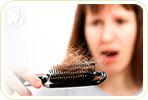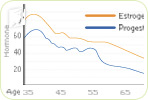Although the thought of losing hair during menopause can be scary and unpleasant, a wide variety of treatments are available to help treat and prevent menopausal hair loss.
Lifestyle Changes
You might find that simply incorporating a few lifestyle changes into your daily routine can have significantly positive effects on hair loss.
Reduce stress

Women who lead stressful lives may also experience higher rates of hair loss. You may try to reduce stress and treat hair loss by doing yoga, practicing breathing techniques, or cutting back your workload. Of course, these things are easier said than done. If you are struggling to combat stress, you might try talking to a counselor about new strategies.
Proper nutrition
Nutrition is vitally important for hair health, especially during a significant stage of change such as menopause. Try make sure you are consuming adequate amounts of iron, protein, and vitamins A, B, and C to help prevent hair loss during menopause.
Alternative Medicine
There are also herbal supplements that you can use in conjunction with lifestyle changes to effectively treat hair loss.
Phytoestrogenic supplements

These herbs (e.g., ginseng, black cohosh) are not always suitable for long-term use. Although they are effective at treating hair loss and other menopause symptoms for some women, they accomplish this by introducing plant-based estrogen into the body. This can reduce naturally existing estrogen levels and making it more difficult for your body to produce estrogen on its own.
Hormone-regulating supplements
Unlike phytoestrogenic herbs, these supplements (such as Macafem) do not contain estrogenic compounds and are therefore a healthier alternative for women who choose to fight hair loss naturally. These herbs stimulate natural hormone production in your body, working to reduce hair loss and other symptoms of menopause.
Medications

Conventional hair loss treatments for menopausal women often involve hormone replacement therapy (HRT). Like phytoestrogenic herbs, HRT introduces hormones (often synthetic estrogen) into your body to replace what's been lost during menopause. Many doctors, however, are seeking other options to help treat hair loss after it was shown in 2002 that HRT can lead to an increased risk of heart disease, blood clots, and cancer.
More Information
For women who want to treat their hair loss and other symptoms of menopause without harmful side effects, a few key lifestyle changes combined with herbal supplements like Macafem can aid in prevention and overall health. For more information on hair loss during menopause, follow the links below.
Sources
- Dinh, Q.Q. & Sinclair, R. (2007). Female pattern hair loss: Current treatment concepts. Clinical Interventions in Aging, 2(2), 189-199. Retrieved from http://www.ncbi.nlm.nih.gov/pmc/articles/PMC2684510/
- Dr.McNair, Trisha.(n.d)."Hair Loss".BBC Health.Retrieved from http://www.bbc.co.uk
- Mayo Clinic.(n.d)."Hair Loss". Retrieved from www.mayoclinic.com
- National Health Service UK. (2015). Women and hair loss: coping tips. Retrieved January 27, 2016, from http://www.nhs.uk/livewell/hairloss/pages/womenandhairloss.aspx
- Park, S.Y. et al. (2013). Iron plays a certain role in patterned hair loss. Journal of Korean medical science, 28(6), 934-938. doi: 10.3346/jkms.2013.28.6.934
- Riedel-Baima, B. & Riedel, A. (2008). Female pattern baldness may be triggered by low oestrogen to androgen ratio. Endocrine regulations, 42(1), 13-16. Retrieved from http://www.ncbi.nlm.nih.gov/pubmed/18333699
- The American Hair Loss Association.(n.d)."Women Hair Loss". Retrieved from http:// www.americanhairloss.org.



